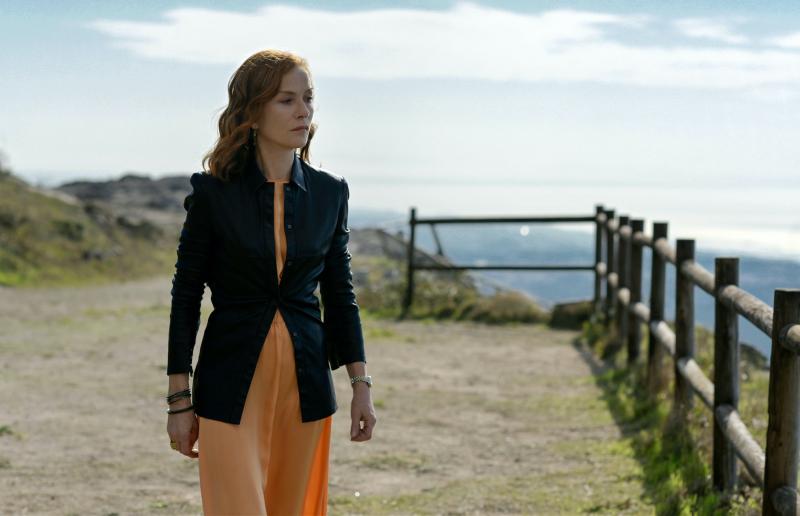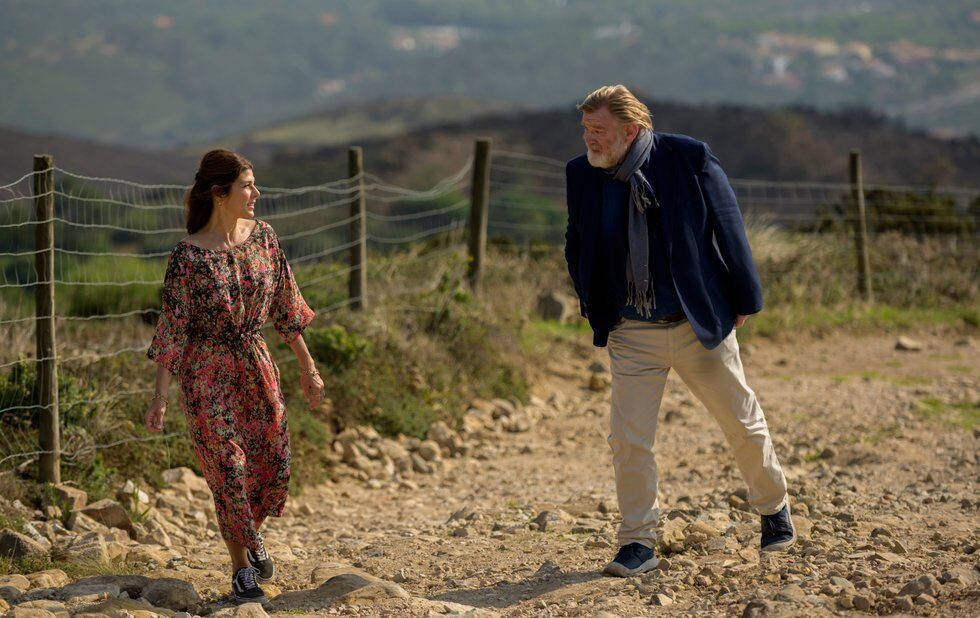Frankie review - dying for nuance | reviews, news & interviews
Frankie review - dying for nuance
Frankie review - dying for nuance
Isabelle Huppert stars in Ira Sachs's disappointingly wan homage to Eric Rohmer

American filmmaker Ira Sachs excels at crafting throughtful relationship dramas in which middle-class characters confronted with crises or unanticipated realisations gain valuable emotional knowledge. His best works – Forty Shades of Blue (2005), Keep the Lights On (2012), and Little Men (2016) – demonstrate an evenness and maturity rare in the rough and tumble of indie cinema.
Conceived as a light meditation on mortality and the ties that bind, Frankie is built around Huppert’s title character, a beloved French film star whose full name is Françoise Crémont. The cancer Frankie though she’d subdued has returned and, solemn but stoical, she has invited her nearest and dearest to join her in Sintra for what will almost certainly be her last vacation. They listlessly wander the sunlit medieval town having sad or faintly amusing chance encounters.
Frankie's fellow actor and doting second husband Jimmy (Gleeson) is grief-stricken but tries to put on a brave face, Paul (Jérémie Renier), her self-absorbed businessman son from her first marriage, is licking his romantic wounds and otherwise preoccupied with his imminent move to New York City. His father Michel (Pascal Greggory), a Paris restaurateur who happily entered a relationship with another man after he and Frankie divorced, is quietly resigned. Sylvia (Vinette Robinson), Jimmy’s daughter from an earlier relationship, is irritated by the presence of the sad-sack husband Ian (Ariyon Bakare) she intends to leave.
 Their teenage daughter Maya (Sennia Nanua) is morose in their company. The New York-based film set hairdresser Ilene (Marisa Tomei), a friend Frankie hopes will make a suitable match with the unanchored Paul, has inconveniently brought along her boyfriend Gary (Greg Kinnear). A film cameraman, he's been working on the second unit of the latest Star Wars production in Spain – the kind of bland detail Sachs and his regular co-writer Mauricio Zacharias should have avoided. (Pictured above: Marisa Tomei and Brendan Gleeson.)
Their teenage daughter Maya (Sennia Nanua) is morose in their company. The New York-based film set hairdresser Ilene (Marisa Tomei), a friend Frankie hopes will make a suitable match with the unanchored Paul, has inconveniently brought along her boyfriend Gary (Greg Kinnear). A film cameraman, he's been working on the second unit of the latest Star Wars production in Spain – the kind of bland detail Sachs and his regular co-writer Mauricio Zacharias should have avoided. (Pictured above: Marisa Tomei and Brendan Gleeson.)
A few interesting things happen. After sternly rebuking Frankie for swimming topless in their hotel pool, Maya – at the “breaking away” stage, yet fearful of her parents separating – matter-of-factly has a fling with a handsome local guide. Whiny wannabe director Gary (who’s clearly never going to realise his personal film project) proposes to Ilene and – silently answered by her sphinx-like smile – promptly departs. One wishes she’d accepted his clumsy offer so that Tomei, mannered here, could have left the picture with Kinnear. Instead, Ilene stays on to hear, reluctantly, an excruciating confession from Paul that explains why he, Frankie, Jimmy, and Sylvia never became a family when he and Sylvia were teenagers.
There are to be no collective meals, farewell speeches or emotional farewells – or any sense of clannishness. Save Frankie and Jimmy, they all remain disparate figures, each on her or his own course. Only once do Frankie, her relatives, and Ilene assemble – and that’s for an unintended rendezvous, a testament to the love felt for the dying woman, in which they are scattered across the summit of a vast brown hill, the symbolically setting sun strafing the Atlantic in the top right of the frame. Alongside Huppert (impassively and impeccably Huppert-esque), Porto-born cinematographer Rui Poças (whose work on Tabu and Zama is indelible) is the star here – not that his lambent images of Sintra are especially redolent of Frankie’s psychic state.
Sachs is expressive with long shots, and the image of these miniaturised people heading, for once, in the same direction as they follow Frankie and Jimmy downhill, is as powerful as the long shot juxtaposing Little Men’s bike-riding pre-pubescent protagonist to the monumental Verrazzano-Narrows Bridge (which connects Brooklyn to Staten Island). The idea is that, like the conquistadors and their Inca slaves and mules descending one of the Andes in Werner Herzog’s Aguirre, Wrath of God, human are ants subject to forces beyond their control in the space-time continuum – though stronger if they stick together. The long-held hill shot adds a concluding grace note to Frankie it’s beige, undernourished script hasn’t earned.
All too clearly, Sachs’s seventh feature – his first to compete In the Cannes festival’s main competition, as it did at last year’s virtual event – was an homage to the philosophical cinema of Eric Rohmer, notably his 1980s "Comedies and Proverbs" and 1990s "Tales of the Four Seasons". Rohmer’s genius was for illuminating the fault line between his maundering, hesitant characters’ needs and desires on one hand and their mercurial, frequently self-defeating behaviour on the other without judging them or explicating their psychological issues. In contrast, Frankie’s characters (Frankie and Maya aside thanks to Huppert and Nanua) lack behavioural nuance, as if their souls hadn't intrigued Sachs and Zacharias. Trust the writing duo to return with deeper insights.
rating
Explore topics
Share this article
The future of Arts Journalism
You can stop theartsdesk.com closing!
We urgently need financing to survive. Our fundraising drive has thus far raised £49,000 but we need to reach £100,000 or we will be forced to close. Please contribute here: https://gofund.me/c3f6033d
And if you can forward this information to anyone who might assist, we’d be grateful.

Subscribe to theartsdesk.com
Thank you for continuing to read our work on theartsdesk.com. For unlimited access to every article in its entirety, including our archive of more than 15,000 pieces, we're asking for £5 per month or £40 per year. We feel it's a very good deal, and hope you do too.
To take a subscription now simply click here.
And if you're looking for that extra gift for a friend or family member, why not treat them to a theartsdesk.com gift subscription?
more Film
 The Other Way Around review - teasing Spanish study of a breakup with unexpected depth
Jonás Trueba's film holds the romcom up to the light for playful scrutiny
The Other Way Around review - teasing Spanish study of a breakup with unexpected depth
Jonás Trueba's film holds the romcom up to the light for playful scrutiny
 The Road to Patagonia review - journey to the end of the world
In search of love and the meaning of life on the boho surf trail
The Road to Patagonia review - journey to the end of the world
In search of love and the meaning of life on the boho surf trail
 theartsdesk Q&A: actor Emma Mackey on 'Hot Milk' and life education
The Anglo-French star of 'Sex Education' talks about her new film’s turbulent mother-daughter bind
theartsdesk Q&A: actor Emma Mackey on 'Hot Milk' and life education
The Anglo-French star of 'Sex Education' talks about her new film’s turbulent mother-daughter bind
 Blu-ray: A Hard Day's Night
The 'Citizen Kane' of jukebox musicals? Richard Lester's film captures Beatlemania in full flight
Blu-ray: A Hard Day's Night
The 'Citizen Kane' of jukebox musicals? Richard Lester's film captures Beatlemania in full flight
 Hot Milk review - a mother of a problem
Emma Mackey shines as a daughter drawn to the deep end of a family trauma
Hot Milk review - a mother of a problem
Emma Mackey shines as a daughter drawn to the deep end of a family trauma
 The Shrouds review - he wouldn't let it lie
More from the gruesome internal affairs department of David Cronenberg
The Shrouds review - he wouldn't let it lie
More from the gruesome internal affairs department of David Cronenberg
 Jurassic World Rebirth review - prehistoric franchise gets a new lease of life
Scarlett Johansson shines in roller-coaster dino-romp
Jurassic World Rebirth review - prehistoric franchise gets a new lease of life
Scarlett Johansson shines in roller-coaster dino-romp
 theartsdesk Q&A: director Andreas Dresen on his anti-Nazi resistance drama 'From Hilde, with Love'
The East German-born filmmaker explains why his biopic of the activist Hilde Coppi isn't bound to the 1940s
theartsdesk Q&A: director Andreas Dresen on his anti-Nazi resistance drama 'From Hilde, with Love'
The East German-born filmmaker explains why his biopic of the activist Hilde Coppi isn't bound to the 1940s
 Chicken Town review - sluggish rural comedy with few laughs (and one chicken)
A comedy great gets lost in an English backwater
Chicken Town review - sluggish rural comedy with few laughs (and one chicken)
A comedy great gets lost in an English backwater
 F1: The Movie review - Brad Pitt rolls back the years as maverick racer Sonny Hayes
Joseph Kosinski's motorsport spectacle delivers bang for your buck
F1: The Movie review - Brad Pitt rolls back the years as maverick racer Sonny Hayes
Joseph Kosinski's motorsport spectacle delivers bang for your buck
 Bleak landscapes and banjos: composer Bernard Hughes discusses his score for 'Chicken Town'
Our critic talks about his recent film project
Bleak landscapes and banjos: composer Bernard Hughes discusses his score for 'Chicken Town'
Our critic talks about his recent film project

Add comment